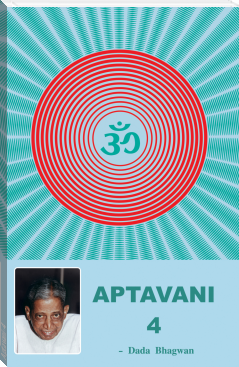Among the Forces - Henry White Warren (books for 8th graders TXT) 📗

- Author: Henry White Warren
Book online «Among the Forces - Henry White Warren (books for 8th graders TXT) 📗». Author Henry White Warren
quickly they can do the ascents. They simply proclaim that their object is not to see and enjoy, but to boast. We go up the lateral moraine, a huge ridge fifty feet high, with rocks in it ten feet square turned by the mighty plow of ice below. We scramble up the rocks of the mountain. Hour after hour we toil upward. At length we come to the snow-slopes, and are all four roped together. There are great crevasses, fifty or a hundred feet deep, with slight bridges of snow over them. If a man drops in the rest must pull him out. Being heavier than any other man of the party I thrust a leg through one snow-bridge, but I had just fixed my ice ax in the firm abutment and was saved the inconvenience and delay of dangling by a rope in a chasm. The beauty of these cold blue ice vaults cannot be described. They are often fringed with icicles. In one place they had formed from an overhanging shelf, reached the bottom, and then the shelf had melted away, leaving the icicles in an apparently reversed condition. We passed one place where vast masses of ice had rolled down from above, and we saw how a breath might start a new avalanche. We were up in one of nature's grandest workshops.
How the view widened! How the fleeting cloud and sunshine heightened the effect in the valley below! The glorious air made us know what the man meant who every morning thanked God that he was alive. Some have little occasion to be thankful in that respect.
Here we learned the use of a guide. Having carefully chosen him, by testimony of persons having experience, we were to follow him; not only generally, but step by step. Put each foot in his track. He had trodden the snow to firmness. But being heavier than he it often gave way under my pressure. One such slump and recovery takes more strength than ten regular steps. Not so in following the Guide to the fairer and greater heights of the next world. He who carried this world and its burden of sin on his heart trod the quicksands of time into such firmness that no man walking in his steps, however great his sins, ever breaks down the track. And just so in that upward way, one fall and recovery takes more strength than ten rising steps.
Meanwhile, what of the weather? Uncertainty. Avalanches thundered from the Breithorn and Lyskamm, telling of a penetrative moisture in the air. The Matterhorn refused to take in its signal flags of storm. Still the sun shone clear. We had put in six of the eight hours' work of ascent when snow began to fall. Soon it was too thick to see far. We came to a chasm that looked vast in the deception of the storm. It was only twenty feet wide. Getting round this the storm deepened till we could scarcely see one another. There was no mountain, no sky. We halted of necessity. The guide said, "Go back." I said, "Wait." We waited in wind, hail, and snow till all vestige of the track by which we had come--our only guide back if the storm continued--was lost except the holes made by the Alpenstocks. The snow drifted over, and did not fill these so quickly.
Not knowing but that the storm might last two days, as is frequently the case, I reluctantly gave the order to go down. In an hour we got below the storm. The valley into which we looked was full of brightest sunshine; the mountain above us looked like a cowled monk. In another hour the whole sky was perfectly clear. O that I had kept my faith in my aneroid! Had I held to the faith that started me in the morning--endured the storm, not wavered at suggestions of peril, defied apparent knowledge of local guides--and then been able to surmount the difficulty of the new-fallen snow, I should have been favored with such a view as is not enjoyed once in ten years; for men cannot go up all the way in storm, nor soon enough after to get all the benefit of the cleared air. Better things were prepared for me than I knew; indications of them offered to my faith; they were firmly grasped, and held almost long enough for realization, and then let go in an hour of darkness and storm.
I reached the Riffelhouse after eleven hours' struggle with rocks and softened snow, and said to the guide, "To-morrow I start for the Matterhorn." To do this we go down the three hundred stories to Zermatt.
Every mountain excursion I ever made has been in the highest degree profitable. Even this one, though robbed of its hoped-for culmination, has been one of the richest I have ever enjoyed.
THE MATTERHORN
The Matterhorn is peculiar. I do not know of another mountain like it on the earth. There are such splintered and precipitous spires on the moon. How it came to be such I treated of fully in _Sights and Insights_. It is approximately a three-sided mountain, fourteen thousand seven hundred and eighteen feet high, whose sides are so steep as to be unassailable. Approach can be made only along the angle at the junction of the planes.
It was long supposed to be inaccessible. Assault after assault was made on it by the best and most ambitious Alp climbers, but it kept its virgin height untrodden. However, in 1864, seven men, almost unexpectedly, achieved the victory; but in descending four of them were precipitated, down an almost perpendicular declivity, four thousand
feet. They had achieved the summit after hundreds of others had failed. They had reveled in the upper glories, deposited proof of their visit, and started to return. According to law, they were roped together. According to custom, in a difficult place all remain still, holding the rope, except one who carefully moves on. Croz, the first guide, was reaching up to take the feet of Mr. Haddow and help him down to where he stood. Suddenly Haddow's strength failed, or he slipped and struck Croz on the shoulders, knocking him off his narrow footing. They two immediately jerked off Rev. Mr. Hudson. The three falling jerked off Lord Francis Douglas. Four were loose and falling; only three left on the rocks. Just then the rope somehow parted, and all four dropped that great fraction of a mile. The mountain climber makes a sad pilgrimage to the graves of three of them in Zermatt; the fourth probably fell in a crevasse of the glacier at the foot, and may be brought to the sight of friends in perhaps two score years, when the river of ice shall have moved down into the valleys where the sun has power to melt away the ice. This accident gave the mountain a reputation for danger to which an occasional death on it since has added.
Each of these later unfortunate occurrences is attributable to personal perversity or deficiency. Peril depends more on the man than on circumstances. One is in danger on a wall twenty feet high, another safe on a precipice of a thousand feet. No man has a right to peril his life in mere mountain climbing; that great sacrifice must be reserved for saving others, or for establishing moral principle.
The morning after coming from Monte Rosa myself and son left Zermatt at half past seven for the top of the Matterhorn, twelve hours distant, under the guidance of Peter Knubel, his brother, and Peter Truffer, three of the best guides for this work in the country. In an hour the dwellings of the mountain-loving people are left behind, the tree limit is passed soon after, the grass cheers us for three hours, when we enter on the wide desolation of the moraines. Here is a little chapel. I entered it as reverently and prayed as earnestly for God's will, not mine, to be done as I ever did in my life, and I am confident that amid the unutterable grandeur that succeeded I felt his presence and help as fully as at any other time.
At ten minutes of two we were roped together and feeling our way carefully in the cut steps on a glacier so steep that, standing erect, one could put his hand upon it. We were on this nearly an hour. Just as we left it for the rocks a great noise above, and a little to the south, attracted attention. A vast mass of stone had detached itself from the overhanging cliff at the top, and falling on the steep slope had broken into a hundred pieces. These went bounding down the side in long leaps. Wherever one struck a cloud of powdered stone leaped into the air, till the whole mountain side smoked and thundered with the grand cannonade. The omen augured to me that the mountain was going to do its best for our reception and entertainment. Fortunately these rock avalanches occur on the steep, unapproachable sides, and not at the angle where men climb.
How the mountain grew upon us as we clung to its sides! When the great objects below had changed to littleness the heights above seemed greater than ever. At half past four we came to a perpendicular height of twenty feet, with a slight slope above. Down this precipice hung a rope; there was also an occasional projection of an inch or two of stone for the mailed foot. At the top, on a little shelf, under hundreds of feet of overhanging rock, some stones had been built round and over a little space for passing the night. The rude cabin occupied all the width of the shelf, so that passing to its other end there was not room to walk without holding on by one's hands in the crevices of the wall. We were now at home; had taken nine hours to do what could be done in eight. What an eyrie in which to sleep! Below us was a sheer descent, of a thousand or two feet, to the glacier. Above us towered the crest of the mountain, seemingly higher than ever. The sharp shadow of the lofty pyramid lengthened toward Monte Rosa. Italy lifted up its mountains tipped with sunshine to cheer us. The Obernese Alps, beyond the Rhone, answered with numerous torches to light us to our sleep. According to prearrangement, at eight o'clock we kindled a light on our crag to tell our friends in Zermatt that we had accomplished the first stage of our journey. They answered instantly with a cheery blaze, and we lay down to sleep.
When four of us lay together I was so crowded against the wall that I thought if it should give way I could fall two thousand feet out of bed without possibility of stopping on the way. The ice was two feet thick on the floor, and by reason of the scarcity of bedding I was reminded of the damp, chilly sheets of some unaired guest-chambers. I do not think I slept a moment, but I passed the night in a most happy, thoughtful, and exultant frame of mind.
At half past
How the view widened! How the fleeting cloud and sunshine heightened the effect in the valley below! The glorious air made us know what the man meant who every morning thanked God that he was alive. Some have little occasion to be thankful in that respect.
Here we learned the use of a guide. Having carefully chosen him, by testimony of persons having experience, we were to follow him; not only generally, but step by step. Put each foot in his track. He had trodden the snow to firmness. But being heavier than he it often gave way under my pressure. One such slump and recovery takes more strength than ten regular steps. Not so in following the Guide to the fairer and greater heights of the next world. He who carried this world and its burden of sin on his heart trod the quicksands of time into such firmness that no man walking in his steps, however great his sins, ever breaks down the track. And just so in that upward way, one fall and recovery takes more strength than ten rising steps.
Meanwhile, what of the weather? Uncertainty. Avalanches thundered from the Breithorn and Lyskamm, telling of a penetrative moisture in the air. The Matterhorn refused to take in its signal flags of storm. Still the sun shone clear. We had put in six of the eight hours' work of ascent when snow began to fall. Soon it was too thick to see far. We came to a chasm that looked vast in the deception of the storm. It was only twenty feet wide. Getting round this the storm deepened till we could scarcely see one another. There was no mountain, no sky. We halted of necessity. The guide said, "Go back." I said, "Wait." We waited in wind, hail, and snow till all vestige of the track by which we had come--our only guide back if the storm continued--was lost except the holes made by the Alpenstocks. The snow drifted over, and did not fill these so quickly.
Not knowing but that the storm might last two days, as is frequently the case, I reluctantly gave the order to go down. In an hour we got below the storm. The valley into which we looked was full of brightest sunshine; the mountain above us looked like a cowled monk. In another hour the whole sky was perfectly clear. O that I had kept my faith in my aneroid! Had I held to the faith that started me in the morning--endured the storm, not wavered at suggestions of peril, defied apparent knowledge of local guides--and then been able to surmount the difficulty of the new-fallen snow, I should have been favored with such a view as is not enjoyed once in ten years; for men cannot go up all the way in storm, nor soon enough after to get all the benefit of the cleared air. Better things were prepared for me than I knew; indications of them offered to my faith; they were firmly grasped, and held almost long enough for realization, and then let go in an hour of darkness and storm.
I reached the Riffelhouse after eleven hours' struggle with rocks and softened snow, and said to the guide, "To-morrow I start for the Matterhorn." To do this we go down the three hundred stories to Zermatt.
Every mountain excursion I ever made has been in the highest degree profitable. Even this one, though robbed of its hoped-for culmination, has been one of the richest I have ever enjoyed.
THE MATTERHORN
The Matterhorn is peculiar. I do not know of another mountain like it on the earth. There are such splintered and precipitous spires on the moon. How it came to be such I treated of fully in _Sights and Insights_. It is approximately a three-sided mountain, fourteen thousand seven hundred and eighteen feet high, whose sides are so steep as to be unassailable. Approach can be made only along the angle at the junction of the planes.
It was long supposed to be inaccessible. Assault after assault was made on it by the best and most ambitious Alp climbers, but it kept its virgin height untrodden. However, in 1864, seven men, almost unexpectedly, achieved the victory; but in descending four of them were precipitated, down an almost perpendicular declivity, four thousand
feet. They had achieved the summit after hundreds of others had failed. They had reveled in the upper glories, deposited proof of their visit, and started to return. According to law, they were roped together. According to custom, in a difficult place all remain still, holding the rope, except one who carefully moves on. Croz, the first guide, was reaching up to take the feet of Mr. Haddow and help him down to where he stood. Suddenly Haddow's strength failed, or he slipped and struck Croz on the shoulders, knocking him off his narrow footing. They two immediately jerked off Rev. Mr. Hudson. The three falling jerked off Lord Francis Douglas. Four were loose and falling; only three left on the rocks. Just then the rope somehow parted, and all four dropped that great fraction of a mile. The mountain climber makes a sad pilgrimage to the graves of three of them in Zermatt; the fourth probably fell in a crevasse of the glacier at the foot, and may be brought to the sight of friends in perhaps two score years, when the river of ice shall have moved down into the valleys where the sun has power to melt away the ice. This accident gave the mountain a reputation for danger to which an occasional death on it since has added.
Each of these later unfortunate occurrences is attributable to personal perversity or deficiency. Peril depends more on the man than on circumstances. One is in danger on a wall twenty feet high, another safe on a precipice of a thousand feet. No man has a right to peril his life in mere mountain climbing; that great sacrifice must be reserved for saving others, or for establishing moral principle.
The morning after coming from Monte Rosa myself and son left Zermatt at half past seven for the top of the Matterhorn, twelve hours distant, under the guidance of Peter Knubel, his brother, and Peter Truffer, three of the best guides for this work in the country. In an hour the dwellings of the mountain-loving people are left behind, the tree limit is passed soon after, the grass cheers us for three hours, when we enter on the wide desolation of the moraines. Here is a little chapel. I entered it as reverently and prayed as earnestly for God's will, not mine, to be done as I ever did in my life, and I am confident that amid the unutterable grandeur that succeeded I felt his presence and help as fully as at any other time.
At ten minutes of two we were roped together and feeling our way carefully in the cut steps on a glacier so steep that, standing erect, one could put his hand upon it. We were on this nearly an hour. Just as we left it for the rocks a great noise above, and a little to the south, attracted attention. A vast mass of stone had detached itself from the overhanging cliff at the top, and falling on the steep slope had broken into a hundred pieces. These went bounding down the side in long leaps. Wherever one struck a cloud of powdered stone leaped into the air, till the whole mountain side smoked and thundered with the grand cannonade. The omen augured to me that the mountain was going to do its best for our reception and entertainment. Fortunately these rock avalanches occur on the steep, unapproachable sides, and not at the angle where men climb.
How the mountain grew upon us as we clung to its sides! When the great objects below had changed to littleness the heights above seemed greater than ever. At half past four we came to a perpendicular height of twenty feet, with a slight slope above. Down this precipice hung a rope; there was also an occasional projection of an inch or two of stone for the mailed foot. At the top, on a little shelf, under hundreds of feet of overhanging rock, some stones had been built round and over a little space for passing the night. The rude cabin occupied all the width of the shelf, so that passing to its other end there was not room to walk without holding on by one's hands in the crevices of the wall. We were now at home; had taken nine hours to do what could be done in eight. What an eyrie in which to sleep! Below us was a sheer descent, of a thousand or two feet, to the glacier. Above us towered the crest of the mountain, seemingly higher than ever. The sharp shadow of the lofty pyramid lengthened toward Monte Rosa. Italy lifted up its mountains tipped with sunshine to cheer us. The Obernese Alps, beyond the Rhone, answered with numerous torches to light us to our sleep. According to prearrangement, at eight o'clock we kindled a light on our crag to tell our friends in Zermatt that we had accomplished the first stage of our journey. They answered instantly with a cheery blaze, and we lay down to sleep.
When four of us lay together I was so crowded against the wall that I thought if it should give way I could fall two thousand feet out of bed without possibility of stopping on the way. The ice was two feet thick on the floor, and by reason of the scarcity of bedding I was reminded of the damp, chilly sheets of some unaired guest-chambers. I do not think I slept a moment, but I passed the night in a most happy, thoughtful, and exultant frame of mind.
At half past
Free e-book «Among the Forces - Henry White Warren (books for 8th graders TXT) 📗» - read online now
Similar e-books:





Comments (0)